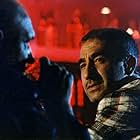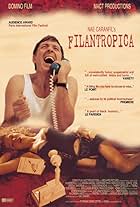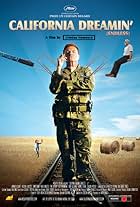Ajouter une intrigue dans votre langueA small world of bourgeois intrigues and frivolities lived with intensity by its own protagonists: Pampon's lover, Didina is in love with the barber Nae, who is Mitza's lover, while she is C... Tout lireA small world of bourgeois intrigues and frivolities lived with intensity by its own protagonists: Pampon's lover, Didina is in love with the barber Nae, who is Mitza's lover, while she is Cracanel's lover. One letter starts the ball rolling and ugly characters start revealing th... Tout lireA small world of bourgeois intrigues and frivolities lived with intensity by its own protagonists: Pampon's lover, Didina is in love with the barber Nae, who is Mitza's lover, while she is Cracanel's lover. One letter starts the ball rolling and ugly characters start revealing themselves in a burlesque-like fashion.
- Réalisation
- Scénario
- Casting principal
Photos
Avis à la une
It is where Kusturica was invented. It is where Kusturica learned his metier.
Isn't this enough for a true experience?
Anyway, I remember that, when we left the theater, at the end of the movie, weirdly enough, we all had terrible headaches, which everyone admitted to. What not everyone admitted to, though, was that Pintilie simply made a down-right mockery of the unique Romanian humor that Caragiale was the embodiment of.
I would characterise Romanian humor as positive, light-hearted and intelligent. What Pintilie did was to replace the intelligence with bitter sarcasm and the positiveness and light-heartedness with ill will and disdain. He used a notorious work of art to boost his homecoming, the same way he used a plethora of extraordinarily talented Romanian actors, in the making of this movie. I wonder if they knew what they were getting into...
No wonder no one laughed or even smiled during the presentation. Pintilie politicized a classic comedic masterpiece, to fit his agenda, whatever that was. He wanted to represent himself as an outspoken dissident, in a country that had recently overthrown a communist government. But where was he when that happened, because he returned to Romania after the fact.
I actually tried to find some blinding-shiny moments in Pintilie's career during the time he was living abroad but no record of such highlights seem to really exist. As if, only in Romania, he was unconditionally praised and welcomed with opened arms.
Is this why he was mad? Is this why he wanted to crush the essence of Romanian humor, because misery wants company? In my opinion, Pintilie acted like the teenager who runs away from home with unrealistic expectations and when he faces rejection, he comes back home and takes his frustrations on his parents.
I haven't met Pintilie in person but I met artists who knew him well. Some were fallen under his spell and some were not. But by all accounts, it seemed to me that Pintilie managed to build an aura of of intellectual and creative superiority around him. And no one was really willing to burst that bubble out in the open.
I cannot speak about Pintilie's work before France, because I'm not familiar with it. All I know is that I tried watching a couple of other movies that he made after his return and could not bear to watch them until the end. And, no, I'm not a brainless actor or lacking education. I would firmly say, quite the contrary. And this is why I don't care to fit in and go with the trend. This is why I cannot be fooled by smug intellectualism and pretentious accolades that have no base in reality, either. So, if this movie is "not so well known", maybe it's not really a "pearl". How about it?
And yet I was disappointed, because the film is too much marked by the poor technical means of the Romanian cinema of that time. It is not that the film lacks vision. Using texts from Caragiale's plays and short stories Pintile creates a vision of Romanian low class suburbs ('mahala') which is both true to the past and present but also somehow prophetic for what Romania went through after the fall of the communism. An exquisite team of the best Romanian comedy actors gives great performances, with Mariana Mihutz shining over all other. And yet, the story telling lacks fluency, and the rhythms and colors are too often broken by the confusion created by poor technical quality. Too bad - this could have been a masterpiece of the Romanian cinema.
It does not matter the dramas, as it does not matter the story more than to give you a good perspective on hard life and easy living.
After seeing it twice you take this movie from a 7/10 to 9/10, 'cause your life perspective has changed.
There is more than an eye can meet.
This is not meant to be useful, don't read more, see the movie.
Le saviez-vous
- AnecdotesRomania's official submission to the 63rd Academy Awards (1991) for Best Foreign Language Film.
Meilleurs choix
Détails
- Durée1 heure 59 minutes
- Couleur
Contribuer à cette page


















